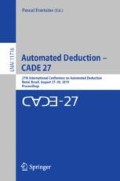Abstract
For theorem proving applications, the aspect calculus for reasoning about states and actions has some advantages over existing situation calculus formalisms, and also provides an application domain and a source of problems for first-order theorem provers. The aspect calculus provides a representation for reasoning about states and actions that is suited to modular domains. An aspect names a portion of a state, that is, a substate, such as a room in a building or a city in a country. Aspects may have aspects of their own. A state is assumed to be either a leaf state that cannot be further decomposed, or to be composed of substates, and actions associated with one substate do not influence other, disjoint substates. This feature can reduce the number of frame axioms that are needed if the domain has a modular structure. It can also permit planning problems on independent substates to be solved independently to some degree. However, interactions between independent substates are also permitted.
Access this chapter
Tax calculation will be finalised at checkout
Purchases are for personal use only
References
Davis, E.: Representations of Commonsense Knowledge. Morgan Kaufmann, Burlington (1990)
Denecker, M., Ternovska, E.: Inductive situation calculus. Artif. Intell. 171(5–6), 332–360 (2007)
Haas, A.R.: The case for domain-specic frame axioms. In: Brown, F.M. (ed.) The Frame Problem in Artificial Intelligence, Proceedings of the 1987 Workshop, pp. 343–348. Morgan Kaufmann (1987)
Hayes, P.: The frame problem and related problems in artificial intelligence. In: Elithorn, A., Jones, D. (eds.) Artificial and Human Thinking, pp. 45–59. Jossey-Bass Inc., Elsevier Scientific Publishing Company, San Francisco, Amsterdam (1973)
Lin, F.: Situation calculus. In: van Harmelen, F., Lifschitz, V., Porter, B. (eds.) Handbook of Knowledge Representation, pp. 649–669. Elsevier, Amsterdam (2008)
Lin, F., Reiter, R.: State constraints revisited. J. Logic Comput. 4(5), 655–678 (1994)
McIlraith, S.A.: Integrating actions and state constraints: a closed-form solution to the ramification problem (sometimes). Artif. Intell. 116(1), 87–121 (2000)
McCarthy, J., Hayes, P.: Some philosophical problems from the standpoint of artificial intelligence. In: Meltzer, B., Michie, D. (eds.) Machine Intelligence 4, pp. 463–502. Edinburgh University Press, Edinburgh (1969)
Matos, P.A., Martins, J.P.: Contextual logic of change and the ramification problem. In: Coasta, E., Cardoso, A. (eds.) EPIA 1997. LNCS, vol. 1323, pp. 267–278. Springer, Heidelberg (1997). https://doi.org/10.1007/BFb0023928
Pednault, E.P.D.: ADL: exploring the middle ground between STRIPS and the situation calculus. In: Proceedings of the International Conference on Principles of Knowledge Representation (KR-1998), pp. 324–332. Morgan Kaufmann Inc. (1989)
Petrick, R.P.A.: Cartesian situations and knowledge decomposition in the situation calculus. In: Principles of Knowledge Representation and Reasoning: Proceedings of the Eleventh International Conference, KR 2008, Sydney, Australia, 16–19 September 2008, pp. 629–639 (2008)
Reiter, R.: The frame problem in the situation calculus: a simple solution (sometimes) and a completeness result for goal regression. In: Lifschitz, V. (ed.) Artificial Intelligence and Mathematical Theory of Computation: Papers in Honor of John McCarthy, pp. 359–380. Academic Press, Cambridge (1991)
Schubert, L.: Monotonic solution of the frame problem in the situation calculus: an efficient method for worlds with fully specified actions. In: Kyburg, H.E., Loui, R.P., Carlson, G.N. (eds.) Knowledge Representation and Defeasible Reasoning, vol. 5, pp. 23–67. Kluwer Academic Publishers, Dordrecht (1990)
Shanahan, M.: The ramification problem in the event calculus. In: Proceedings of the 16th International Joint Conference on Artifical Intelligence - Volume 1, IJCAI 1999, pp. 140–146. Morgan Kaufmann Publishers Inc., San Francisco (1999)
Scherl, R.B., Levesque, H.J.: The frame problem and knowledge-producing actions. In: Proceedings of the Eleventh National Conference on Artificial Intelligence (AAAI-1993), Washington, D.C., USA, pp. 689–697. AAAI Press/MIT Press (1993)
Ternovska, E.: Id-logic and the ramification problem for the situation calculus. In: ECAI (2000)
Thielscher, M.: Introduction to the fluent calculus. Electron. Trans. Artif. Intell. 2, 179–192 (1998)
Author information
Authors and Affiliations
Corresponding author
Editor information
Editors and Affiliations
Rights and permissions
Copyright information
© 2019 Springer Nature Switzerland AG
About this paper
Cite this paper
Plaisted, D.A. (2019). The Aspect Calculus. In: Fontaine, P. (eds) Automated Deduction – CADE 27. CADE 2019. Lecture Notes in Computer Science(), vol 11716. Springer, Cham. https://doi.org/10.1007/978-3-030-29436-6_24
Download citation
DOI: https://doi.org/10.1007/978-3-030-29436-6_24
Published:
Publisher Name: Springer, Cham
Print ISBN: 978-3-030-29435-9
Online ISBN: 978-3-030-29436-6
eBook Packages: Computer ScienceComputer Science (R0)

